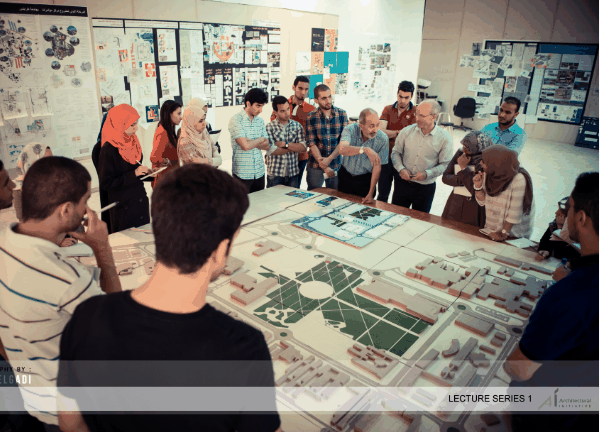Further, the students’ experience of architecture in Libya has often been skewed by the context of icon buildings and one-off villas which has taken their approach to design down “blind alleys” of picture-making and shape-making, rather than the greater challenges of mass housing and urban design. In the context of a post-revolutionary country, in whose freedom many have had a hand and in whose future they hold a stake, irrelevance is no longer an option.
The University syllabus of designing real buildings – “Live Projects”– forces relevance upon the students by positioning them between the commercial interests of real clients and the demands for design quality from (what Architecture Initiative hopes will become) a steady stream of visiting Architects as critics. As proxies for the identity and place-making debate, the students must confront the issues that will define Libya in years to come. The evident appetite for our visit showed that Libya’s architectural students and the profession alike are ready for the challenge.
Architectural Initiative:
Architectural Initiative was created by a group of British and Libyan Architects and has the support of Libyan scholars who are interested in creating collaborative academic partnerships between international built environment institutes and Libya's educational institutions. Architectural Initiative's mission is to run architectural programs within Libya to educate and inspire the Libyan architectural community by increasing student and public awareness of the challenges facing the built environment. This will be achieved by providing a forum for interaction with international leaders, role models, artists, academics and other prominent members of international architectural society.
The lecture series is Architectural Initiative's first organised project in association with Tripoli University's Department of Architecture and Urban Planning. They have hosted Cullinan Studio who have been supportive of the initiative since its inception and are the first British Architects to start the Lecture Series. The main sponsors of the lecture were the Libyan architectural practice Allabina Architecture & Engineering Consultancy as well as the RIBA (Royal Institute of British Architects) who have provided both guidance and financial support. The other sponsors were Libyan Institutes of Architects, the Martyr Square Media, Libya Design, Home and Garden Show and Andalusia.
The programme consisted of a public lecture as well as a lecture to students, followed by a series of workshops and crits with final year students.





